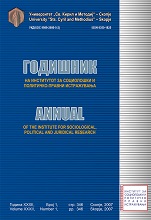THE GLOBAL GOVERNANCE THEORY AND SOVEREIGNTY IN GLOB-ALIZATION CONDITIONS
THE GLOBAL GOVERNANCE THEORY AND SOVEREIGNTY IN GLOB-ALIZATION CONDITIONS
Author(s): Aneta CekikjSubject(s): Governance, Government/Political systems, Geopolitics
Published by: Институт за социолошки и политичко-правни истражувања
Keywords: global management; globalization; sovereignty; scientific concepts of governance;
Summary/Abstract: The concept of global governance is a new concept within the framework of the discipline of Inter-national Relations. It has emerged as a specific perspective of globalization and the end of the Cold War giving a different sense to sovereignty and the position of the states in the new global world. The traditions of the theories of international regimes and international organizations, as well as the transnationalism and the nongovernmental forms of acting, constitute the foundations of the claim that the states are no longer unique actors on the domestic and international political stage, and that new forms of governance beyond the state are both likely and essential. The relocation of authority (fragmentation and integration) at a subnational (local and regional) and transnational level to new spheres of authority is in the very core of the analysis of the authors who have been applying this concept as a relevant analytical tool. This work briefly presents its application in normative sense - as a political program and a hegemonic discourse.
Journal: Annual of the Institute for Sociological, Political and Juridical Research
- Issue Year: XXXII/2007
- Issue No: 1
- Page Range: 203-214
- Page Count: 12
- Language: English, Macedonian

